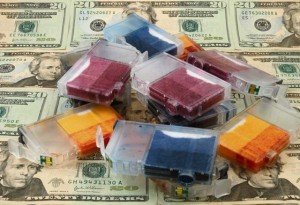Empty printer cartridges still contain residues of toxic, environmental and health-endangering substances and do not belong in regular waste. So what should you do with them? Most cartridges can be recycled. They will be inspected and refilled and then resold to consumers.

The plastic in printer cartridges takes over 1,000 years to decompose. With landfills filling up quickly, printer cartridges that are thrown away as trash instead of being recycled present a real problem.
Consider these important facts, as well. It takes three pounds of resources, including 3.5 ounces of oil, to produce a printer cartridge. Recycled cartridges take much less, usually just replacement ink and a few small parts.
Recycling cartridges can save a ton of money. Recycled cartridges provide the same quality as new cartridges while costing less than brand new ones.
Many companies also offer rebates for turning in used cartridges, meaning that spent cartridge sitting in the home office awaiting disposal may actually have real cash value.
By disposing of empty cartridges the right way, raw materials and energy needed to produce new products will be reduced. Manufacturers and sellers are required by the German Waste Ordinance to take back cartridges for free. The customer service desk of the Exchange on Panzer Kaserne accepts empty cartridges.
Here are helpful steps to get ink and laser toner cartridges into the recycling system:
• Before you purchase, find an online or local store that will accept your empty cartridges from you.
• Upon receiving the new cartridge, look at the instructions in the box to find out how to recycle your old one. Many companies will provide instructions with a returnable envelope and free postage.
• You should always use the original packaging to ensure that the cartridge is not damaged during shipping.
• Send it back to the store or the manufacturer or take it back to the local store where you purchased it.
